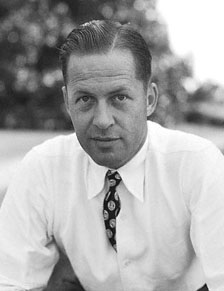
Robert Tyre Jones
Come Masters weekend, golf’s rank and file fans will be joined by millions of drop-bys. They will look for a spare chair in the living room and ask who’s winning, what an eagle is, why anyone would wear that ridiculous get-up. But most simply absorb the beauty of the golf course, and as they do, they fall silent and grow attentive. A very few of them have little stories they can tell.
Among the kibbitzers is my ex-father-in-law. Never a golfer, he is however, a Georgia native, Atlanta born and bred. In the ‘60s, as the South agonized its way through still more of the seemingly endless toils of its past, Atlanta billed itself as “the city too busy to hate.” It was plausible. Coca Cola and IBM were as much institutions as blue ribbon businesses, and segregation had no place in their business models. Their names alone gave Atlanta a worldly aura, and in time, a skyline matched by no city in the South.
A booster mentality obtained. Business was good. Upward mobility was real. Everything was about moving forward. There was at that time no more important or powerful institution in the city of Atlanta than the Chamber of Commerce. C of C luncheons brought the city’s business elite to table with its up-and-comers, and they were not to be missed.
Yet for all of its sky-is-the-limit enthusiasm, Atlanta was in some respects as much a part of the Old South as any nook of the Confederacy. Courtesy bordering on courtliness was still the way people treated one another. Even as it looked forward, Atlanta was a city that felt the tug of its past.
My father-in-law worked for Atlanta magazine, which did more than support the city’s positive outlook: it helped articulate, focus and energize it. The Chamber’s events were a natural for him to attend. And that was how he came to be riding in an elevator one noon when the doors opened and admitted, in the glittering cage of a wheelchair, a slight man, plainly withered by whatever wasting disease he suffered from.
What struck my father-in-law was the man’s self-possession. While he was obviously pained by how much space his wheelchair used, he didn’t apologize for it. No need. The atmosphere in the elevator had turned electric. Everyone knew who he was. When he was rolled into the dining room, there was a slight murmur. Atlanta’s elite paid respects not by stopping over to gladhand, but by not stopping over to gladhand. The volume of conversation in the room dropped for the balance of the event.
That was all. But in a room full of wealth and ambition, the kind of place most likely to pay no heed to its past, he was the center of attention. If one thought about it, he was hard to get a handle on. The magnificent golfer, of course. But what about the engineering degree from the Georgia Institute of Technology, the English degree from Harvard, the JD from Emory? What kind of mind enquired into such varied disciplines with such obvious command? And there was his fate: the athlete denied the use of his body, for the spinal disease he contracted did just that, and would kill him before his time. He was hard to get at. In a roomful of his native Atlanta’s most elite strivers, gravitas attached to the man who had no great fortune, ran no great company, whose great deeds were a generation old.
Hearing this years later, I wondered what my father-in-law had said upon that chance encounter with Bobby Jones. A simple hello? A handshake and a word or two?
He was silent for a bit, and then he said: “No. There was no such person as Bobby Jones. All anybody in Georgia knew was Mr. Jones. I heard him called Bob Jones sometimes, and that was borderline acceptable coming from people who new him well. That implied a familiarity. But to me, and most folks, he was Mr. Jones. Pure and simple.”
I imagine it is difficult to lose your personhood and become an icon, and that is exactly what happened to Mr. Jones. Who ever managed it better? He was, in one sense, lucky, because he put his gifts to work in yet another field, designing Augusta National, which all at once deflected attention from the man, and came to represent him. He left behind not only his legacy as a player, but one of golf’s most sublime golf courses, and a tournament that squeezes the breath out of the best players in world.
People from around the globe will tune in for the theater that the old peach orchard in Augusta produces every April. And Georgia will pay its respects to Mr. Jones in the way it always has: not by presuming a false familiarity with the man, but by glorying in his most enduring achievement.
